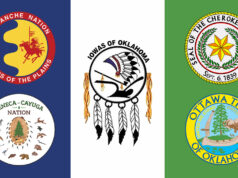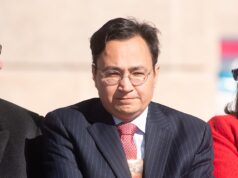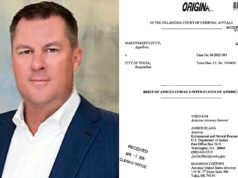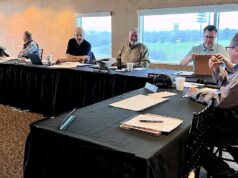
The future of a federal law designed to protect Native American children landed in front of the U.S. Supreme Court on Wednesday in a case that could potentially reshape the tribal sovereignty landscape for years to come.
The case, Haaland v. Brackeen, stems from the attempted adoption of a Navajo boy by the non-Native Brackeen family of Fort Worth, Texas. In 2016, a Navajo child was placed in the temporary care of the Brackeens by Texas child protective services as they searched for a permanent home. When the parental rights of the child were terminated, the Brackeens said they requested to adopt the child, with the approval of his biological mother.
The request was blocked by the Navajo Tribe which sought to move the child to a tribal home in New Mexico, under the Indian Child Welfare Act protocols adopted by Congress in 1978. But the Brackeens, even though they were able to adopt the child a year after the Navajo effort failed, continued to pursue legal action, winning their case in both the federal district court and the conservative 5th Circuit Court of Appeals.
This story was reported by Gaylord News, a Washington reporting project of the Gaylord College of Journalism and Mass Communication at the University of Oklahoma.
In a SCOTUS hearing that lasted more than three hours Wednesday, two lawyers representing the Fort Worth couple and the state of Texas made clear their opposition to ICWA. They insisted the law was unconstitutional because of its direct violation of the U.S. Constitution’s equal protection clause, while also highlighting the damage it does to native children currently in the foster care system.
“The Indian Child Welfare Act deprives Indian children of the best interests of the child test,” said Matthew D. McGill, petitioner for the Brackeen family, in his opening remark. “It replaces that test with a hierarchy of placement preferences that puts non-Indian families at the bottom of the list.”
But Ian H. Gershengorn, a lawyer for the Cherokee Nation, called ICWA the “gold standard” of child adoption systems and cited the federal government’s responsibility to Indigenous children’s health.
“Since the founding, the health and safety of Indian children has been the province of the federal government and tribes, not the states,” said Gershengorn.
ICWA was passed during a time when tribes were attempting to fight the long-standing practices of removal, separation and assimilation of Indigenous children into non-native society. This, along with the troublesome history of Indian boarding schools, forced Congress to address these issues and uphold their commitment to tribal sovereignty, as stated in the U.S. Constitution.
‘Does it really have no limits?’
Justice Neil Gorsuch, a former member of the Denver 10th Circuit Court of Appeals which hears cases from Oklahoma, challenged the lawyers for Brackeen and the state of Texas in a long series of questions in which he expressed his inclination to uphold ICWA.
“Counsel, I’m struggling to understand your argument,” said Gorsuch.
Suggesting the state was applying the equal protection clause incorrectly, Gorsuch cut to the heart of his questions asking whether any sued federal officials can tell a state court what to do. When the petitioner replied that they could not, Gorsuch bluntly stated his apparent position on the case.
“I would think that might be the end of it,” he said. “What am I missing?”
Conservative Justice Samuel Alito questioned how much power Congress has in terms of regulating tribal affairs.
“Does it really have no limits?” Alito asked. “Could Congress go further than it has gone in ICWA and say that an Indian child may not be adopted by an — by a non-Indian couple under any circumstances?”
Liberal Justices Sonia Sotomayor and Elena Kagan, however, laid out the long history of congressional laws and “legions of cases” that have affirmed Congress’ commitment to tribal affairs, sovereignty and the importance of native childcare placement.
Conservative Justice Brett Kavanaugh, highlighting the difficult nature of the case and its relationship with the equal protection clause, said, “We have to find the line between fundamental and critical constitutional values.”
The two opposing values are the “great respect for tribal self-government” and the “fundamental principle we don’t treat people differently on account of their race or ethnicity or ancestry,” he said.
The equal protection clause is a section of the 14th Amendment that guarantees the equal protection of people under any governing body at the state or federal level. The clause has been cited in many Supreme Court cases, including Brown v. Board of Education, and is being used in this case to argue against ICWA.
‘We will not stand for the dispossession of our children’
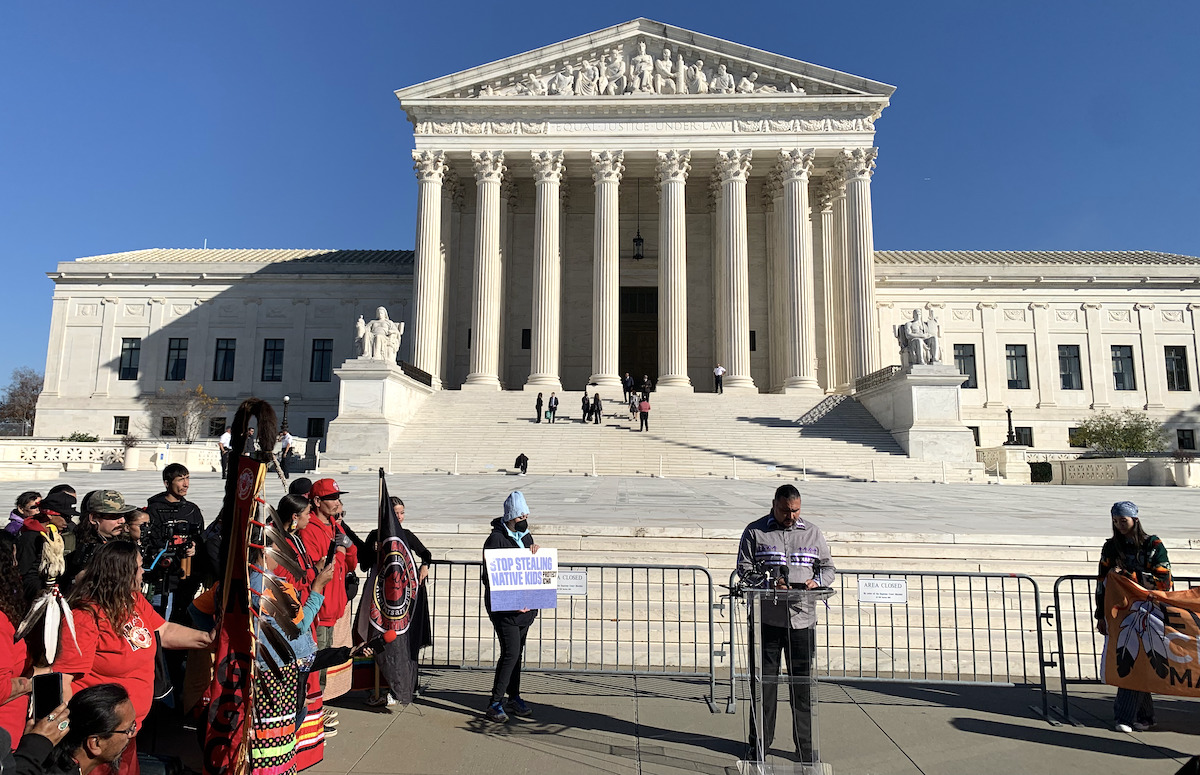
As the deliberation took place inside the court, The Protect ICWA Campaign led an organized rally in front of the court. The rally saw tribal leaders and members from all across the country come together in support of ICWA. Following the conclusion of the hearing, Cherokee Nation Principle Chief Chuck Hoskin Jr. delivered his passionate response to the attack on ICWA.
“We are here today collectively to make our case in court that The Indian Child Welfare Act is constitutional and to send a message to this country that we will not stand for the dispossession of our children and the further erosion of our native peoples,” said Hoskin.
Brackeen v. Haaland will not be the first time ICWA has been challenged in the Supreme Court. In both the 1982 Mississippi Band of Choctaw Indians v. Holyfield case and the 2013 Adoptive Couple v. Baby Girl case, the court did not overturn ICWA.
The court’s decision on the case will be delivered in 2023.












